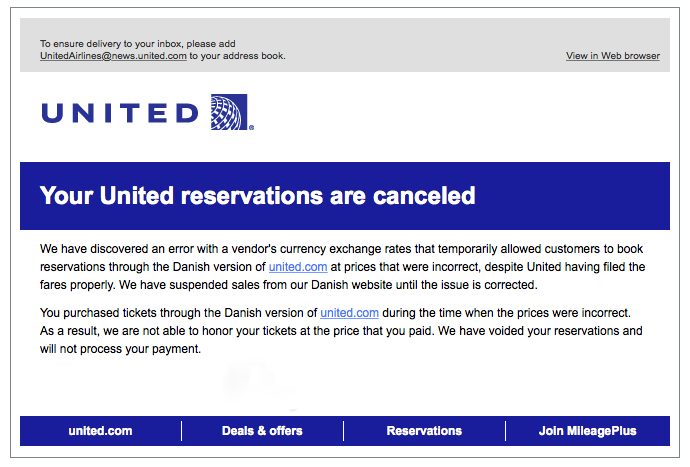
As expected, the U.S. Department of Transportation has rolled back its explicit mandate that airlines honor mistake fares but in doing so has opened up a new loophole that may give carriers an even bigger headache when they inevitably file mistake fares in the future.
Gone is the unequivocal language stating that post-purchase price increases are not even permitted for mistake fares. In a way. The language is still there, but DOT has said that it will not enforce the rule as it ponders a new way to protect consumers from post-purchase price increases while simultaneously not allowing “bad faith” consumers to take advantage of “mistaken fares”.
As a matter of prosecutorial discretion, the Enforcement Office will not enforce the requirement of section 399.88 with regard to mistaken fares occurring on or after the date of this notice so long as the airline or seller of air transportation: (1) demonstrates that the fare was a mistaken fare ; and (2) reimburses all consumers who purchased a mistaken fare ticket for any reasonable, actual, and verifiable out-of-pocket expenses that were made in reliance upon the ticket purchase, in addition to refunding the purchase price of the ticket. These expenses include, but are not limited to, non-refundable hotel reservations, destination tour packages or activities, cancellation fees for non-refundable connecting air travel and visa or other international travel fees. The airline may ask the consumer requesting out-of-pocket expenses to provide evidence (i.e. receipts or proof of cancellations) of actual costs incurred by the consumer. In essence, the airline or seller of air transportation is required to make the consumer “whole” by restoring the consumer to the position he or she was in prior to the purchase of the mistaken fare. The enforcement policy outlined in this notice is temporary and will remain in effect only until the Department issues a final rule that specifically addresses mistaken fares.
We must note that even as the DOT considers alternate ways of adjudicating mistake fare controversy, it may still find that §399.88 is best left unaltered.
If, based on comments received in the rulemaking process, the Department determines that section 399.88 should remain as written, airlines and other sellers of air transportation would be expected to comply and the Enforcement Office would enforce the requirement.
Read the full text here.
Gary and I share similar concerns over the glaring problems of this interim framework.
The object of this shift in enforcement is to crack down on “bad faith” actions, but it actually encourages more bad faith action. In forcing airlines to make consumers whole (using a detrimental reliance legal theory) by compensating non-refundable purchases made in reliance on mistaken fares, the DOT has just incentivized bad faith purchases.
Think of the possibilities: we see a mistake fare that is far too good to be true and we book it, knowing that a carrier is unlikely to honor it. Knowing that the airline will be forced to “make us whole” we get to work booking the rest of the trip. Positioning flights? Check. Five nights under a non-refundable rate at a nearby resort? Check. Pre-paid rental car? Check.
Per DOT, airlines would be on the hook to compensate us for these voluntary expenses if the carrier chooses not to honor the fare. Even if we make the nonrefundable purchases in conjunction with the mistake fare moments after booking and knowing full well United would not offer transatlantic first class for $96 r/t, it does not matter – we would be owed a cash refund from the airlines. And then what is to stop us from using those non-refundable hotel rooms and car rentals anyway?
Of course this will become a game of chicken. And if waiting for a refund becomes anything like dealing with Flying Blue (the woefully lackadaisical loyalty program of Air France/KLM ), it may not be worth the gamble for consumers. I suspect this stipulation will actually make carriers more likely to honor fares than not.
Airlines are not given a deadline for rescinding mistake fares. Under my theoretical framework, airlines and consumers would both have a 24-hour cooling off period as long as travel was more than seven days away. Under the current framework now in place, airlines can let months pass before canceling a ticket on the ground it was issued by mistake. This has grave ramifications when coupled with the next concern.
Consumers (and airlines) have no clear indication of what is a mistake fare. A $96 first class fare may be too good to be true, but what about a $550 trip to India? The DOT says this:
The burden rests with the airline or seller of air transportation to prove to the Enforcement Office that an advertised fare and the resulting ticket sales constitutes a mistaken fare situation.
Brilliant Holmes. That sure makes it clear. We now return to an era of uncertainty, in which we never know whether a fare is a mistake or a sale. Without any sort of mathematical metric or formula for determining a mistake fare (say a fare is a mistake if it is several deviations off the historic norm…though any such method is fraught with problems too), clever airline legal counsels may be able to argue out of a fare their carrier simply regretted filling rather than mistakenly filed.
In Summary
Do not be dismayed – the suspension of enforcing rule §399.88 is not good news, but the new rules forcing airlines to make consumers whole (whether they acted in bad faith or not) will at least give airlines pause before rescinding the inevitable mistake fares of the future.




Where can we write to the DOT that both the airline and consumer should have the same 24 hour period to cancel the fare. I don’t want to be notified late in the game and possibly on the way do the airport that the fare is canceled. also, there should be a reasonable amount of time that the airline should be required to refund all expenses that they are responsible to refund.
The potential for chicanery on the part of passengers is easy enough to eliminate – the airline can simply demand proof of cancellation of any nonrefundable arrangements, as the DOT’s own language suggests they have the right to do. I’d say anyone that intentionally books expensive nonrefundable hotels, tours, etc. with the intention of demanding a cash refund but using the hotel our tour anyway is playing with fire, and stands a good chance of getting burned badly.